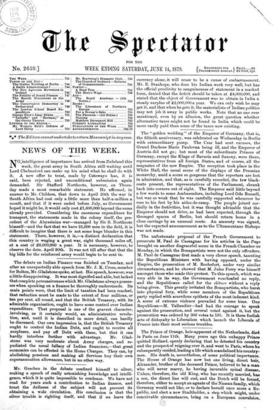The debate on Indian Finance was finished on Tuesday, and
after an unexpectedly able speech from Mr. J. K. Cross, member for Bolton, Mr. Gladstone spoke, at last. His speech, however, was a little disappointing. It was most dignified and able, but lacked that complete persuasiveness which Mr. Gladstone always posses- ses when speaking on a finance he thoroughly understands. Its _main points were, that the limit of taxation had been reached, that reduction must be made to the extent of four millions, or ten per cent, all round, and that the British Treasury, with its admirable organisation, ought to have some control over Indian expenditure. That proposal is one of the gravest character, involving, as it certainly would, an administrative revolu- tion, and, until it is described in more detail, can hardly be discussed. Our own impression is, that the British Treasury ought to control the Indian Debt, and ought to receive all .surpluses, and pay off Debt with them, but that it can hardly interfere further with advantage. Mr. Glad- stone was very moderate about Army charges, and re- pudiated the usual fallacy of Indian financiers,—that great economies can be effected in the Home Charges. They can, by abolishing pensions and making all Services buy their own superannuation allowances, but in no other way.


































